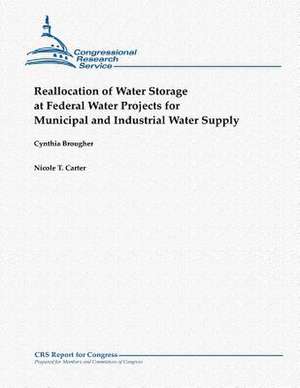Reallocation of Water Storage at Federal Water Projects for Municipal and Industrial Water Supply
Autor Cynthia Brougher, Nicole T. Carteren Limba Engleză Paperback
Preț: 97.26 lei
Nou
Puncte Express: 146
Preț estimativ în valută:
18.62€ • 19.15$ • 15.45£
18.62€ • 19.15$ • 15.45£
Carte disponibilă
Livrare economică 29 ianuarie-12 februarie
Preluare comenzi: 021 569.72.76
Specificații
ISBN-13: 9781481145039
ISBN-10: 1481145037
Pagini: 28
Dimensiuni: 216 x 280 x 2 mm
Greutate: 0.09 kg
Editura: CREATESPACE
ISBN-10: 1481145037
Pagini: 28
Dimensiuni: 216 x 280 x 2 mm
Greutate: 0.09 kg
Editura: CREATESPACE
